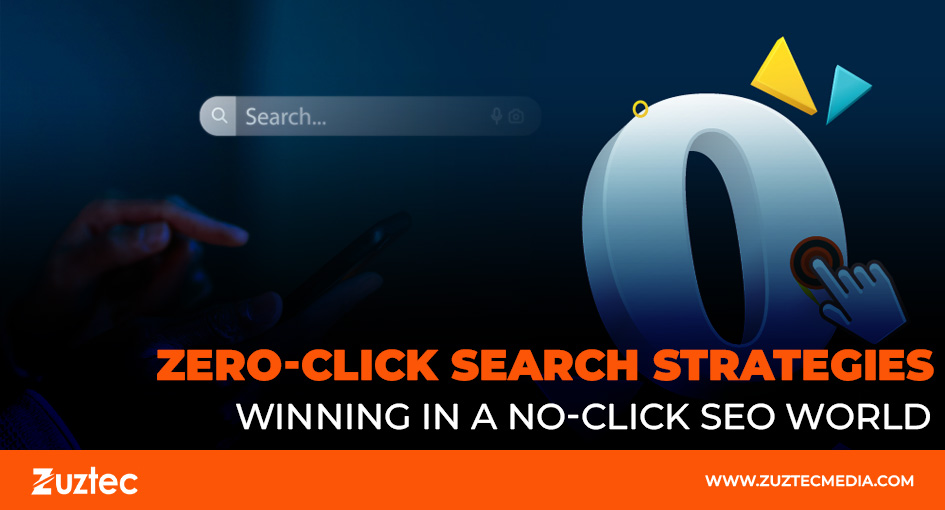
Zero-Click Search Strategies: Winning in a No-Click SEO World
There’s a quiet revolution happening in search engine optimization (SEO), and it’s changing how brands think about visibility and content. In the past, success in search was often measured by how many clicks a website received. But today, thanks to evolving search engine algorithms and changing user behavior, many searches end without a single click. This is the era of the zero-click search strategies.
Zero-click searches occur when users find the answer to their query directly on the search engine results page (SERP) and don’t need to click through to any website. Whether it’s a quick weather update, a conversion rate, or a featured snippet, Google (and other engines) are giving users what they need—immediately. For businesses and marketers, this new landscape demands fresh thinking. Instead of chasing clicks, the goal becomes capturing attention and building authority in ways that don’t always lead to website traffic but still deliver value.
Why Zero-Click Search Strategies Matter
The Rise of Zero-Click Search
The prominence of zero-click strategies stems from the changing nature of how search engines serve information. Google’s push toward SERP features—like featured snippets, knowledge panels, local packs, and People Also Ask boxes—means more answers are displayed directly on the results page. According to a study by SparkToro, more than 65% of Google searches in 2023 ended without a click to another web property. That’s a massive shift.
From the user’s perspective, it’s efficient. But for marketers, it challenges traditional SEO tactics that focus primarily on increasing click-through rates (CTR).
The New SEO Objective
In a zero-click world, the aim isn’t just to bring users to your site—it’s to be seen as the most credible and helpful voice in your niche. This requires optimizing content to show up in SERP features and thinking about visibility beyond the confines of your domain. Smart search strategies focus on positioning your content and brand as part of the answer, not just the destination.
This doesn’t mean traffic becomes irrelevant. It just shifts the focus. For example, appearing in a featured snippet might not get you a click, but it builds brand recognition, boosts perceived expertise, and influences future decisions.
Crafting a Zero-Click Content Strategy
Optimize for Featured Snippets
One of the most powerful components of zero-click search is the featured snippet—the box at the top of Google’s results that attempts to answer the query right away. To capture this real estate, content must be structured in a way that’s clear, concise, and directly answers common questions.
Determine which keywords frequently result in highlighted snippets first. These are usually question-based or instructional queries like “how to,” “what is,” or “why does.” Use bullet points, numbered lists, or short paragraphs to structure your answer. Make sure your page is well-optimized overall, as domain authority and relevance still play key roles in snippet selection.
Including definitions, FAQs, or summaries at the top of a page increases the chance of earning this spot. These brief but informative chunks of content are central to most zero-click search strategies.
Build a Strong Brand Presence on the SERP
If users aren’t clicking, it’s still essential that they notice your brand. Having a consistent, compelling presence across different SERP features—like the knowledge panel, local business listings, and image packs—helps build recognition and trust.
Claim and fully optimize your Google Business Profile. Ensure consistent NAP (name, address, phone number) data across local directories. For knowledge panels, having a Wikipedia page, structured data markup, and schema.org integration helps. And don’t overlook image and video SEO—rich media often appears in search carousels and can drive engagement without a single traditional click.
Leveraging Third-Party Platforms
The Value of External Content Hubs
Not all brand engagement has to happen on your own website. High-ranking third-party platforms—like Quora, Reddit, LinkedIn, Medium, and YouTube—frequently show up in zero-click SERPs. Contributing quality content to these platforms helps extend your reach where your audience is already searching.
This is a subtle but effective component of zero-click search strategies—it’s about being where the attention already is, even if it’s not on your home turf.
Reviews and Aggregators
Customer reviews and aggregator websites like Yelp, TripAdvisor, and Glassdoor often dominate zero-click results, especially for service-based or local businesses. Encouraging satisfied customers to leave reviews, and responding to those reviews professionally, can improve your appearance in the SERP without needing users to click.
This kind of third-party credibility is more important than ever. People may never reach your site, but they might choose your business based on what’s visible in the summary boxes or top reviews they see in Google results.
Structured Data and Technical SEO
Use Schema Markup Strategically
From how-to articles to product reviews, recipes to events—structured data makes your content more likely to show up in engaging and interactive formats on the SERP. This technical enhancement is one of the cornerstones of zero-click search strategies, especially for sites that publish diverse content types.
Improve Page Load Times and Mobile UX
Since many zero-click queries happen on mobile devices, having a fast-loading, mobile-friendly site remains crucial—even when you’re not the final click destination. If users do choose to explore further, poor usability will drive them away immediately. Plus, load speed and mobile-friendliness contribute to search rankings, which influences your visibility in snippets and other SERP features.
Ultimately, the rise of zero-click search may seem like a challenge at first—but it’s also a tremendous opportunity. With the right zero-click search strategies, brands can dominate the SERP, build trust, and influence users without ever relying solely on a visit to their website.
This new landscape rewards those who can offer value instantly, structure content smartly, and focus on visibility over vanity. As search engines evolve to prioritize user experience, it’s time for marketers to evolve too. Whether through featured snippets, local listings, or third-party platforms, the brands that adapt will not only survive—but thrive—in a world where clicks are no longer the end goal.

